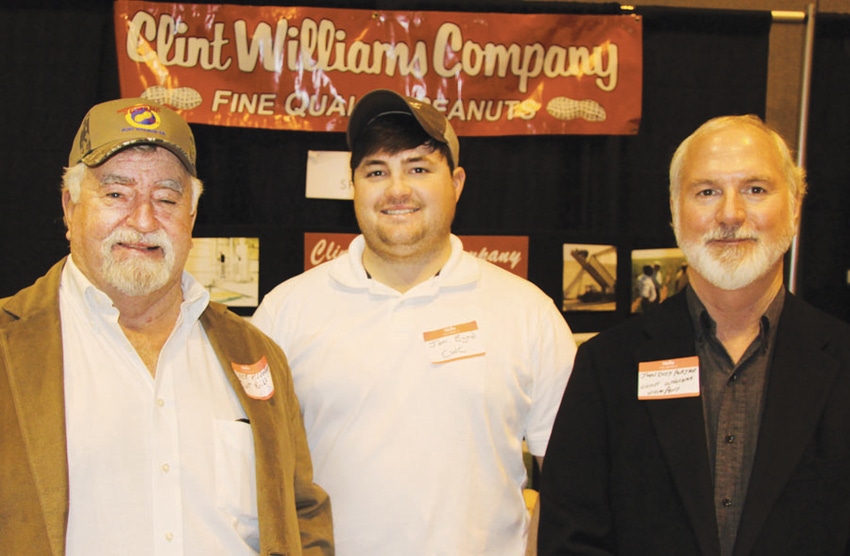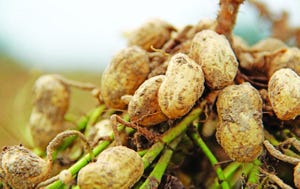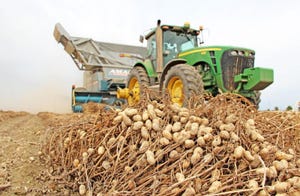
“We’ve been losing peanut acres in Texas over the last six or seven years, particularly for runner peanuts, and we’ve been looking for new areas to maintain and increase our supply,” says Alan Ortloff, president of the Clint Williams Company, who spoke at the annual meeting of the Mississippi Peanut Growers Association.“The drought in west Texas in 2011 further emphasized to us the importance of diversifying our supply lines.“We like what we see in Mississippi — fertile land, ample water, and high caliber, professional farmers, who can produce high-yielding, high quality peanuts.”

The three major players in the U.S. peanut industry say their major investments in new facilities and support — particularly in Mississippi and Arkansas — are an indication of their expectation that new production areas will be needed to meet future demand.
Officials of Birdsong Peanuts, the Clint Williams Company, and Golden Peanuts discussed their outlook for the industry at the annual meeting of the Mississippi Peanut Growers Association at Hattiesburg.
Clint Williams Company
The Clint Williams Company has made “a large investment” in new facilities in Mississippi and Arkansas “to help insure our peanut supply for the next generation,” says Alan Ortloff, president of the Madill, Okla., company. “We’ve been losing peanut acres in Texas over the last six or seven years, particularly for runner peanuts, and we’ve been looking for new areas to maintain and increase our supply,” he said at the annual meeting of the Mississippi Peanut Growers Association at Hattiesburg.
“We’re limited in west Texas by the water supply. We’ve been working with that, but nobody could have foreseen the devastating 100-year drought that occurred in 2011 and resulted in probably the worst crop we’ve ever dealt with. This further emphasized to us the importance of diversifying our supply lines.
“We like what we see in Mississippi — fertile land, ample water, and high caliber, professional farmers, who can produce high-yielding, high quality peanuts,” Ortloff says. The company has constructed two new multi-million-dollar buying points in the state, one at Clarksdale, the other at Greenwood.
“These are state-of-the art facilities, with oversize handling, loading, and unloading equipment,” he says. “We can unload a semi-trailer in about 7 minutes. These are by far the largest peanut warehouses in the U.S., and we think in the world. Each will hold 25,000 and 26,000 tons of peanuts.”
That makes a total of 13 company owned buying points, Ortloff says. All rest are in Oklahoma and Texas. The company has three commission buying points, one each in Texas, Oklahoma, and Pocahontas, Ark., which was built last year.
“We buy over a very large area, stretching from west Texas into Arkansas and Mississippi, over 850 miles wide. All our peanuts are transported to Madill.”
The Clint Williams Company, like others in the industry, is still trying to work out from under a 2012 crop that “was by far the largest in U.S. history — and one that had everyone scared to death a few months ago about how we would market all those peanuts,” Ortloff says.
Last year’s 3.37 million ton crop was more than 600,000 tons above the previous record of 2.7 million tons in 2008, and over 1.5 million tons more than 2011’s drought-shortened short crop of 1.83 million tons.
But an outlook that was on the dismal side has been brightened, he says, by “something phenomenal that has happened in recent weeks and really made a difference to our industry” — significant purchases by China.
India, which had been shipping the majority of its peanuts to China, cut its peanut exports by two-thirds. Reasons included a below-normal crop, new food safety standards, and an improving economy, which created more demand by India’s own population.
Competitive in world markets
“With our lower prices because of our huge crop, we’re very competitive in the world market,” Ortloff says, “and the Chinese know they can get clean, high grade peanuts from us. They’re not buying just oil or butter grade peanuts, they’re buying jumbos and mediums. They’ve come into the market in a big way, and we’re hoping we can continue to have them as a market for U.S. peanuts.
“All U.S. shellers have sold peanuts to China, and it looks like they may need a lot more, which will help us to use up this surplus. Most shellers are operating around the clock. We’ve all sold heavily for the first two quarters of the marketing year; it’s a difficult pace. Blanching plants are loaded up, too, and that’s another factor that will affect market.
“U.S. manufacturers weren’t buying any peanuts, and we’re seeing some signs that they buying now that they know shellers have unloaded large quantities of peanuts into China, and that there are questions about whether there’s enough shelling capacity to meet the manufacturers’ needs.
All this has been very refreshing.”
The late Clint Williams, company founder, “was a natural-born entrepreneur who was always on the cutting edge,” Ortloff says. “He officially started business in 1961 as a peanut handler, buying peanuts for shellers as the Texoma Peanut Company.
“He personally introduced the runner peanut into the Southwest in the early 1970s and in the early 1980s introduced the Virginia-type peanut.
“In 1968, we built our in-shell processing plant, which launched us into the export market in a big way; in-shell and shelled goods are a big part of our business all over the world.
“Clint Williams is unique in that, for the last 25 years, we’ve exported a greater percentage of our product than any other sheller. Golden and Birdsong export more tons than we do, but our percentage exported is bigger. We’re very oriented to the export market, as well as the domestic market.”
Golden Peanut Company
“We’re excited about the future of peanuts in Mississippi,” says Kris Lutt, the president of Golden Peanut Company.
“I came to Golden in March 2012, and since that time we’ve gone from a crop in short supply and record prices to a record crop and prices that have declined significantly.”
Golden Peanut Company, founded in 1986 by the formation of a partnership between Columbian Peanut Company and Gold Kist Peanuts, is now wholly owned by Archer Daniels Midland Company (ADM).
“What’s really exciting about peanuts,” Lutt says, “is the projected growth in world population and the ongoing need for low cost, high quality protein with great nutritional properties. Today’s 7.5 billion world population is projected to exceed 10 billion by 2050. Feeding all those people will be a challenge.”
One of the things the company does, he says, “is focus on utilizing all assets around the globe — whether in Ukraine, Japan, China, or Moscow — to promote peanuts and make consumers aware of our high quality products. This ability to do business globally is good for everyone in the industry, whether a grower in Mississippi, a sheller, or a processor. And we can utilize our transportation network to expeditiously move U.S. peanuts around the globe.
Follow the value chain
“We like to follow the value chain, from providing seed to the grower, to transporting the peanuts, to processing them,” Lutt says. “And through our research and development programs, we look at ways to transform peanuts into value-added products.
“For example, we continue to look at what can we do with skins and shells; at compounds in the peanut we can extract, or that we need to explore further; and at ways we can do a more efficient job of distribution and selling our peanuts.”
Lutt says Golden focuses on four key areas of peanut value: food, feed, industrial, and fuel.
“We all know peanuts are a great nutritious, low cost protein food. But we also sell hulls and skins in the feed market, along with peanut meal, which is a high quality protein feed. In the fuel sector, we’re pelletizing peanut hulls and shipping the pellets to Europe for bioenergy uses. Companies are switching from using petroleum-based construction equipment to peanut-based oils, giving them a more environmentally-friendly, ‘greener’ operation In the industrial area, granules produced from peanut hulls are being used in fertilizers, insecticides, and other products, and peanut oil has any number of industrial applications.
“We’re continually looking for ways to expand the volume of the products we can offer, and longer term, how we can further diversity tour peanut product portfolio — all of which comes back to the R&D side.”
The company has some unique products, Lutt says. “Peanut flour, for example, is a great niche product — just about any nutrition bar and many cereals use it. To make a pound of flour takes two pounds of peanuts. We also offer roasted aromatic oils, used for special flavorings to provide a distinct peanut taste. We export a lot of this. We also make a peanut extract, a flavoring that goes into cereals to provide a nice, distinct peanut flavor. And refined peanut oil is a high quality, premium oil that’s healthy and has a nice long shelf life.”
Birdsong Peanut Company
Mississippi’s record peanut acreage last year — an estimated 49,000 acres, compared to 15,000 to 18,000 acres in the 2005-2011 period — could grow even more, says Kevin Calhoun, procurement manager Birdsong Peanut Company.
The company significantly increased its facilities at Prairie, Miss., last year and constructed a new buying point facility at Walnut Ridge, Ark., which handled over 25,000 tons of peanuts in its inaugural season.
“Longer term, I think Mississippi has potential for twice the 2012 acreage,” he says.
But not in 2013, when the industry will still be working its way out from under the oversupply from last year’s crop. The Southeast states of Georgia, Alabama, Florida, Mississippi, and Arkansas could see an overall acreage decline of as much as 30 percent to 40 percent this year, Calhoun says.
Birdsong, headquartered at Suffolk, Va., operates in 10 states, has 750 employees, six peanut shelling plants, and 85 buying points.
The company had its start when the founder of Planters Peanuts, who started out selling peanuts on the sidewalks in Virginia, needed to increase his supply of peanuts. He worked out a deal with the Birdsongs to contract with growers for their peanuts.
“That was in 1914, and we give Planters a lot of the credit for our company,” Calhoun says.
Birdsong initially began buying peanuts from producers in south Mississippi, then branched out into the Delta, and later began working with growers in east Mississippi who wanted another cash crop for diversification.
“At that time, we were transporting peanuts 200 miles to south Alabama, so we established the buying point at Prairie, and we’ve seen a steady growth in that area. We handled a tremendous volume of peanuts there from the 2012 crop.”
About the Author(s)
You May Also Like



